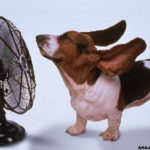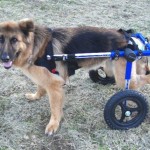Breed Specific Health Concerns in Dogs and Cats
Is YOUR pet at risk?
Did you know that certain breeds are more susceptible to certain health problems? These are called Breed -Specific Health concerns. We thought it might interest you to learn what some of them are. As a holistic clinic, we tailor our recommendations to specific patients based on their needs, rather than following the same protocol with all pets. Some of these differences are outlined in this article. If you know someone with these types of pets, you might pass this on to them and recommend they schedule a holistic checkup with us. Many of these issues can be managed or even prevented in some cases with a holistic approach including regular chiropractic, weight control, and high-quality nutrition and supplements. Keep in mind that mixed breeds with a predominance of one of the following breeds may also be susceptible to that breed’s issues.
Dachshund
—This long-backed breed is well known for its tendency to hind limb paralysis. This condition is caused by the rupture of discs between the spinal vertebrae (intervertebral disc disease, or IVDD), causing injury to the spinal cord. A contributing condition in this breed is obesity. Regular chiropractic every 2-3 months and careful attention to diet can reduce or prevent this serious ailment.
Mastiff, Great Dane, Newfoundland, Great Pyrenees
—These gentle giants and other breeds like them are prone to a condition in the spine called vertebral spondylosis, which is a degenerative response to stress in the spine. This leads to calcification of ligaments along the bottom of the spine which causes stiffness, pain, and difficulty with the hind legs. We treat these patients with a combination of anti-inflammatory and pain-relieving supplements and medications, regular chiropractic, cold laser, and acupuncture.
Corgis
—Like other long-backed dogs, this breed can suffer from IVDD. They also are known to be one of the breeds who can develop a genetic disease called degenerative myelopathy, which is a gradually progressive degeneration of the spinal nerves from the tail end forward. Acupuncture and supplementation, with physical therapy at home, can slow this progression.
German Shepherd
—Where to start? This breed also can develop spondylosis and degenerative myelopathy. They are also known for skin allergies, ear infections (despite their upright ears), and GI problems like inflammatory bowel disease. Hip dysplasia, which are poorly developed hips that become arthritic, and other joint problems are also well known in this breed. We recommend all German Shepherds visit us at least three times yearly for chiropractic, and have their diet and exercise program carefully evaluated.
Labrador Retriever
—Many people with this common breed are aware of their tendency to ear infections, often partly due to their love of swimming. As larger dogs, they often develop spondylosis like the mastiff breeds, or other arthritis. Another condition seen in this and other sporting breeds is laryngeal paralysis which causes loud or harsh breathing sounds, particularly when hot or exercising. Acupuncture, chiropractic, weight management, and joint supplements are often used to manage these conditions.
Golden Retriever
—Unfortunately, this most popular of breeds is also well-known for high cancer risk. They also frequently develop skin allergies and arthritis. Regular checkups and bloodwork plus early evaluation of any new lumps and bumps is important to monitor for cancer. We recommend visits at least twice a year particularly in Goldens over 6 years of age. Skin issues and arthritis may be managed through diet, supplements, special shampoos, and medications. Again, regular chiropractic is important in this larger breed of dog.
Boxer 
—This happy-go-lucky breed is unfortunately known in veterinary circles as a “cancer factory”. It’s very important to keep your boxer on a very high-quality diet and consider supplements to support the immune system to try to fight off cancers early. Like Goldens, twice yearly exams and bloodwork are important as these dogs age. Regular chiropractic can maximize nervous system function as well. We also see spondylosis and degenerative myelopathy in this breed.
Outdoor cats 
–While not a breed, as a class of pet it’s important to address the risks of being an outside cat. They are small enough that they commonly suffer injury or death caused by dogs, cars, and predators like coyotes. They often fight with other cats and develop infected bite wounds. These bite wounds can lead to infection by viruses like feline leukemia and feline immunodeficiency (FeLV and FIV). Outdoor cats suffer from much higher rates of parasite infections and poisoning than their indoor counterparts. Finally, the damage they do to native animal populations cannot be ignored. We use extra vaccinations and parasite control to try to keep these patients healthier, but will always counsel pet owners to keep their cats indoors. Studies have shown that indoor cats have much longer lifespans. We are happy to offer training advice to help you if you feel your cat won’t like being indoors.
Toy dog breeds
—Many toy breeds have luxating patellas. This is a condition in which the kneecap won’t stay in its “groove” and it pops to one side of the knee joint. Many of these dogs will pick the leg up and run three-legged briefly, or walk bow-legged. Sometimes, the kneecap pops in and out so is normal sometimes and out of the joint at others. Surgical correction can be done if the dog is young, but older dogs should have regular chiropractic and possibly should receive joint supplementation to limit arthritis. Toy breeds are also prone to dental problems, so if your little dog has bad breath, schedule an examination to see if their mouth needs attention.
Brachycephalic breeds
—Pug, Boston, Pekingese, Lhasa, Shih tzu, English Bulldog, French Bulldog and others like them—Brachycephalic syndrome is a combination of certain malformations mostly associated with the nose and mouth in these breeds. Small nostrils, a soft palate (roof of mouth) that is overly long and fleshy, and protruding soft tissues within the larynx are hallmarks of this disease. Affected dogs often snore, breathe with an open mouth even when sleeping, and over-heat easily. They can become anxious when struggling to breathe. This distressing condition is often treated with surgery to correct some of these anatomical defects, and affected dogs needing surgery should never be bred to avoid passing these traits to their offspring. We can counsel you on the severity of your pet’s condition and help you manage their weight while we determine if surgery would be of benefit to your pet. 
Terrier breeds
—Many terriers are well-known for skin allergies. A healthy minimally-processed diet and management of gut health with supplements are two ways we help keep these little guys from itching excessively. We have some wonderful healing skin products as well. Cytopoint shots are used to block the factor in an itchy dog’s immune system that makes them itch. These shots have no side effects and, in most dogs, will stop itching 4-8 weeks which allows time for nutritional management to help heal from the inside out.
Long-eared breeds
—Both small and large dogs with floppy ears are prone to ear infections. We are happy to teach pet owners the proper technique for weekly at-home ear cleaning. Again, nutritional management specific to the patient’s needs can help keep their skin healthy enough to fight off infections. Occasionally, dogs with long ears will hit their ear on something, get it injured playing, or scratch at an ear infection too much and cause an aural hematoma, which is broken blood vessels in the ear flap that cause it to appear quite swollen. A minor surgical repair is usually done to correct this problem.
Cavalier King Charles Spaniel
—This popular and sweet breed is unfortunately prone to some serious health issues. Certain spinal deformities like Chiari malformation near the skull can cause neurological problems. They also have a high prevalence of heart problems. Careful attention to chiropractic needs, diet, and possibly specific nutritional supplements to strengthen the heart may help prolong their life and improve symptoms.
Cocker Spaniel
—This breed is prone to ear infections from their long, floppy, hairy ears. Regular ear cleaning can help control this problem. They are also one of the most common breeds to develop glaucoma so regular examinations including their eyes is necessary. This breed is also over-represented among dogs that develop Immune-mediated hemolytic anemia, where the immune system attacks and destroys oxygen-carrying red blood cells. Regular examination and bloodwork may help detect this before it becomes life-threatening, and any cocker showing sudden lethargy or pale gums should be seen immediately. A healthy minimally-processed diet may help keep the immune system from becoming over-reactive.
This newsletter is already long, so obviously we can’t include all breeds and all known common health issues. This just lists some we see the most. Our goal is always to be pro-active with your pet’s health in order to maximize their genetic health potential and minimize issues that could develop if certain conditions in their lifestyle occur. Maintaining a healthy weight and avoiding inflammatory foods are key to control of many of the listed disorders. Regular chiropractic can help maintain joint and nervous system health, plus we often detect issues with pain, arthritis, or even lumps and bumps during the chiropractic examination. Again, please share this information with your friends if they have pets that fall under some of these categories!










